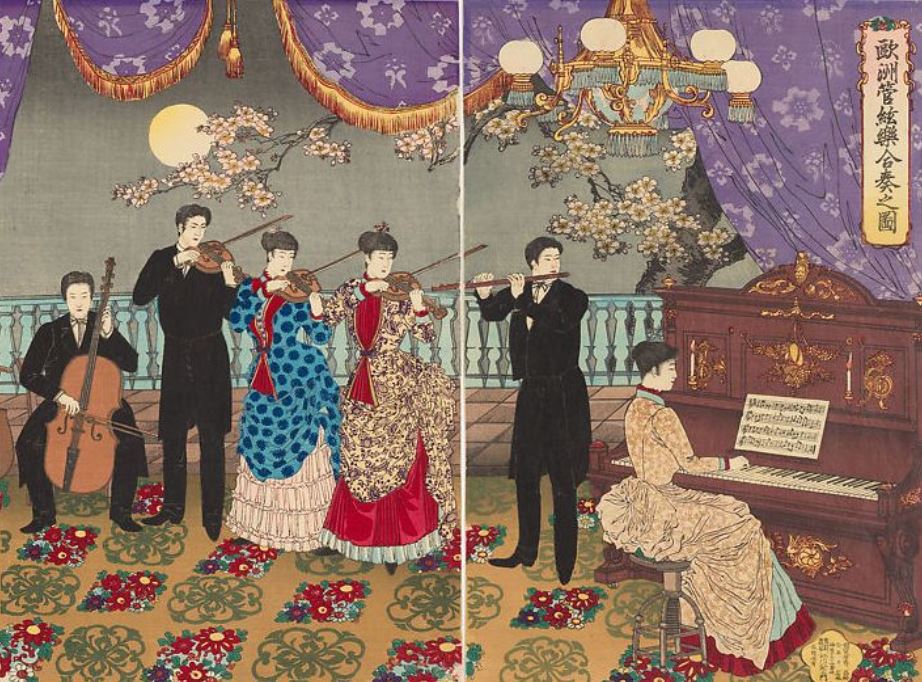
‘Modernization from within’ is simply counter-productive and as part of the process of reforming Islam is an epistemological impossibility. Contemporary religious studies have been formed in a climate of modern scientific, philosophical and industrial revolution. They have no counterparts or parallels in the history of scholarship either among ourselves or any of the southern peoples.
Japan free of ‘hysterical taboos’: A concert of European Music by Yōshū Chikanobu (1838–1912)
EVERY TRUE REFORM is a matter of re-foundation, the initiation of a new model of religious rationality which in religious affairs only recognizes that which reason finds acceptable. Every religious reform goes through a symbolic killing of the father. For our purposes here, it undergoes a break with all that is irrational in the tradition, and thus solves the problem of attempting to re-implement things with antiquated tools. Both processes require the comprehensive reform of education, the media and religious discourse.
Indeed, the reform of Islam can only be achieved by moving from the centuries-long irrational religious school to the desired rational religious school, which alone is qualified to place education and religious discourse on a rational foundation, including the religious discourse in the media.
The transition from the irrational religious school to the rational religious school entails moving from a literal reading of the Qur’ān, particularly the Madinan reading[1] prevailing up to the present day throughout virtually the entire Islamic world, to other readings that may compete with them. Readings which the Madinan version has marginalized or declared ‘un-Islamic’ such as readings that are interpretive, or which focus on that which proves most beneficial to Muslims, or are symbolic or of purely historical significance – readings which the Qur’ān itself has demonstrated in the phenomenon of abrogating and abrogated verses, that is, the cancellation of verses no longer relevant to historically developing circumstances.
The Orthodox Caliphs and a number of fuqahā’ continued this process of abrogating rulings that were no longer answering to the reality of everyday life. This first method of reading the foundational Text, practiced by the Orthodox Caliphs is very necessary for us today. The rational religious school must restore this method. This is what scholars such as Gamāl al-Bannā’, Hasan al-Turabi, Mohamed Talbi, Ghālib bin Shaykh and I myself have been seeking to inaugurate. Historically, the first one to demand a return to the historical reading of abrogating earlier rulings was the late lamented Muhammad ‘Ābir al-Jābrī in 1988.
The importance of employing contemporary studies in comparative religion
It is important to bring in other religions, including Islam and the Qur’ānic phenomenon in particular which has been the subject of study of many Orientalists and even of Muslims such as Mohamed Arkoun in his book Readings of the Qur’ān[2], and Mohammad Ali Amir-Moezzi. This last author oversaw the publication of the Dictionary of the Qur’ān[3] in 2007, writing an important introduction for it on the nature of the Qur’ān, and which has been translated into many languages – except, that is, the actual language of the Qur’ān – Arabic. As the poet Al-Shawqī put it:
Should its nightingales be forbidden to sing, though permitted to birds of every other kind? [4]
When I say the transition from a literal reading to other readings, I mean readings in the light of contemporary studies of religion since the Islamic religious sciences have been surpassed by scholarly developments and are no longer able to respond to the new demands made by the study of the Islamic foundational texts – the Qur’ān and the Hadith – nor to the demands made by the study of the Islamic tradition as such. For this remains far removed from the level of scientific analysis and criticism applied to the other religious traditions, Judaism and Christianity in particular, as is well known.

Suggested Reading
‘Modernization from within’ is simply counter-productive and as part of the process of reforming Islam is an epistemological impossibility. Contemporary religious studies have been formed in a climate of modern scientific, philosophical and industrial revolution. They have no counterparts or parallels in the history of scholarship either among ourselves or any of the southern peoples. These sciences are not some kind of plant or animal that can be indigenized and adapted to a new environment; they are predominantly precise, scientific concepts, theories and laws, and to try to ‘indigenize’ them is synonymous to aborting them. They are not capable of being indigenized.
The ideological background of the slogan of modernization or ‘renewal from within’ is also scientifically unacceptable, for it is in reality an expression of that famous Arab, Islamic ‘specialness’: we are an exceptional people , and what applies to us does not apply to other people who have not been honoured by God with Islam … for it is to us that God spoke for the last time in history, and it is to us that He gave the True Faith, and it is our language that is the language of the people in Paradise. They therefore do not accept any type of reform unless it comes from within or, in other words, they have no need for any reform whatsoever.
Why did Japan manage to do what we have failed to do? Because unlike us it is free of the ancestor-cult that deters it from following the traditions of the ‘infidel’ other.
We are confronted here by a logic of exclusive, narcissistic ancestor-worship that prevails among primitive peoples or those with a primitive mentality. It is time for us now to shed it for the logic of modern peoples, or those with a modern mentality that sees no objection to borrowing new sciences without distorting their scientific rigour to their own logic out of some neurotic impulse. The slogan of ‘modernization from within’ is one of the symptoms of a two-centuries long self-punishment[5] carried out through a series of failed experiments. No nation on earth has modernized itself from within. Japan, from the time of the Meiji government in the nineteenth century, inaugurated their entry into modernity by borrowing European modernity and adopting the Belgian Constitution and its positive laws. Its worshipped Emperor introduced the fork for eating with in place of the traditional Japanese chopsticks, and classical music in place of its indigenous music.
Why did Japan manage to do what we have failed to do? Because unlike us it is free of the ancestor-cult that deters it from following the traditions of the ‘infidel’ other. But the magical thinking of some of our intelligentsia makes the assumption that modernization from within is somehow miraculously possible in our case; unaware, or pretending to be unaware that, sociologically, modernity is an indivisible whole – you either take it or leave it. Unfortunately for us we have for a long time simply left it. Why do we not try, for once, to take it – perhaps it may help us get out of the nightmare of the historical backwardness that has cast us all, the common folk and the intelligentsia alike, into a state of delirium, and which has inflicted upon us this narcissistic wound – a feeling of castration, humiliation and inferiority that is as wide and as deep as the Nile and the Seine combined.
[1] That is, the prioritisation of readings from the Qur’ānic verses revealed at Madīna, when the Prophet was an influential political leader wielding increasing power, over against the verses revealed at the earlier period at Makka, when the Prophet was making the case for the new faith in an environment where the Muslims were in the minority. For an extended treatment of this see the article on Almuslih on Lafif Lakhdar’s last book: Muhammad – from Poet and Prophet in Mecca to Lawmaker and Warrior in Madina.
[2] The Arabic work is also available in French as: Lectures du Coran, 1e éd. Paris 1982; 2e Aleef, Tunis 1991 (Ed).
[3] M.A. Amir-Moezzi, Dictionnaire du Coran, Paris: R. Laffont, 2007. The encyclopaedic work of multiple authors examines the role of the Qur’ān in the development of various component of Islamic culture and aims to give objective information in a field that has frequently become the possession of political propaganda (Ed).
[4] The Egyptian poet Ahmad Shawqī (1868-1932) penned the line أحرام على بلابله الدّوح/حلال للطّير من كل جنس in his poem Sīniyya during his time in Spain lamenting his forced exile there, but has since been adopted to refer to the phenomenon of something that is available to all, except for those with the basic right to have it (Ed).
[5] The author here is alluding to the psychological phenomenon of self-punishment that sufferers undergo in order to assuage feelings of guilt.

